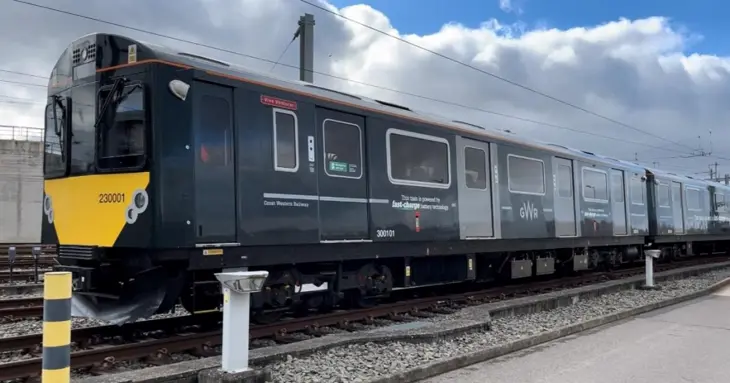Battery-operated train breaks UK record distance

Great Western Railwayhas made a significant step towards making rail travel more sustainable this month, with its battery-operated train breaking the UK record for distance travelled on battery power without recharging.
The innovative FastCharge battery train covered 86 miles without recharging, travelling between Long Marston, Evesham, Moreton-in-Marsh and Honeybourne on Wednesday 14 February 2024, surpassing the previous record held by a Stadler Class 777 in 2022.
In returning to the Reading Train Care Depot where the train will undergo testing and future maintenance, it used just 45 per cent of its battery over a 70-mile journey, with the engineers on board confident it could have done over 120-miles on a single charge.
Dr Simon Green,GWR's engineering director,said: 'We were delighted by how the battery train performed today and during its series of test runs. In fact, it’s fair to say it has surpassed the expectations of our team of engineers.Achieving these distances gives us great confidence as we press forward with this industry-leading FastCharge technology."
Following these successful test runs, FastCharge trains will be trialled in a real-world environment for the first time this spring, with trains operating alongside existing passenger services on the Greenford branch line in West Ealing in London, where the trains will take just 3.5 minutes to charge before their journeys restart.
GWR's FastCharge technology is designed to provide reliable, battery-only trains that can fulfil timetabled services and to eliminate the need for diesel engines or overhead electric lines and help meet the government's target to make the rail industry net zero carbon by 2050.
GWR's FastCharge technology, which was purchased fromVivaRail when the company went into administration, can be installed between the running rails in a matter of hours, with little to no disruption to passengers.
It uses short charge rails that are fully covered by the train and live only when the train is charging. This is very different to third-rail systems where the rail is live all the time and is arguably a safer approach to take.
Network Rail Interim Regional Managing Director, Rob Cairns, said: “This trial marks an important milestone in sustainable travel in the UK. Rail is already the greenest form of public transport and battery-powered trains have the potential to play an important role in our commitment to a low-emission railway, with a goal of reaching net-zero by 2050.”
GWR will capture and analyse data during the trial to understand how the technology performs in different conditions.
